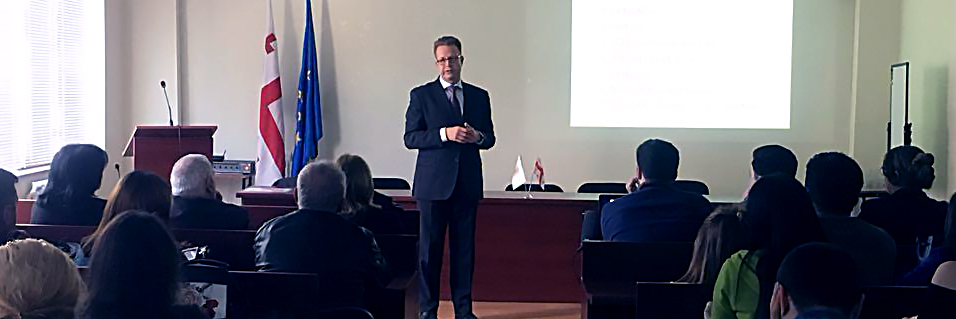
Marshall Center Professor Lectures at Three Universities in Georgia
Topics were “Self-Determination vs. Territorial Integrity,” “Regional fora in Southeast Europe Related to Security” and “A Changing Political Landscape in Europe?”
By Dr. Sebastian Von Münchow
College of International and Security Studies
George C. Marshall European Center for Security Studies
TBILISI, Georgia (May 15, 2018) – Dr. Sebastian von Münchow, Marshall Center professor, gave lectures at the Sulkhan-Saba Orbeliani University, Sokhumi State University and Ilia State University April 25 and 26 in Tbilisi, Georgia.
Topics were “Self-Determination vs. Territorial Integrity,” “Regional fora in Southeast Europe Related to Security” and “A Changing Political Landscape in Europe?”
These lectures were attended by about 120 students, who are studying in law or political science for bachelor’s or master’s degree programs, at the three universities.
Von Münchow said that Georgian officials and alumni, who visited the Marshall Center during a resident course or seminar, invited him to give presentations at Tbilisi’s university.
He was asked by the Sulkhan-Saba Orbeliani University, Sokhumi State University and Ilia State University to provide these lectures tailored to the Southern Caucasus.
“The subject of comparing cooperation schemes between the Balkans and those Eastern countries with Euro-Atlantic aspirations seemed to be of great interest for the audience,” Von Münchow said. “For instance, Georgia and the Ukraine may study well what recent European Union and NATO members like Slovenia, Croatia, Bulgaria and Romania had to go through when they regionally coordinated domestic and international security-related matters before they joined either NATO or the EU.”
“The students followed the lecture intensely and engaged in fruitful discussions on how former and current Balkan cooperation matrix could be applicable for the Southern Caucasus,” he said.